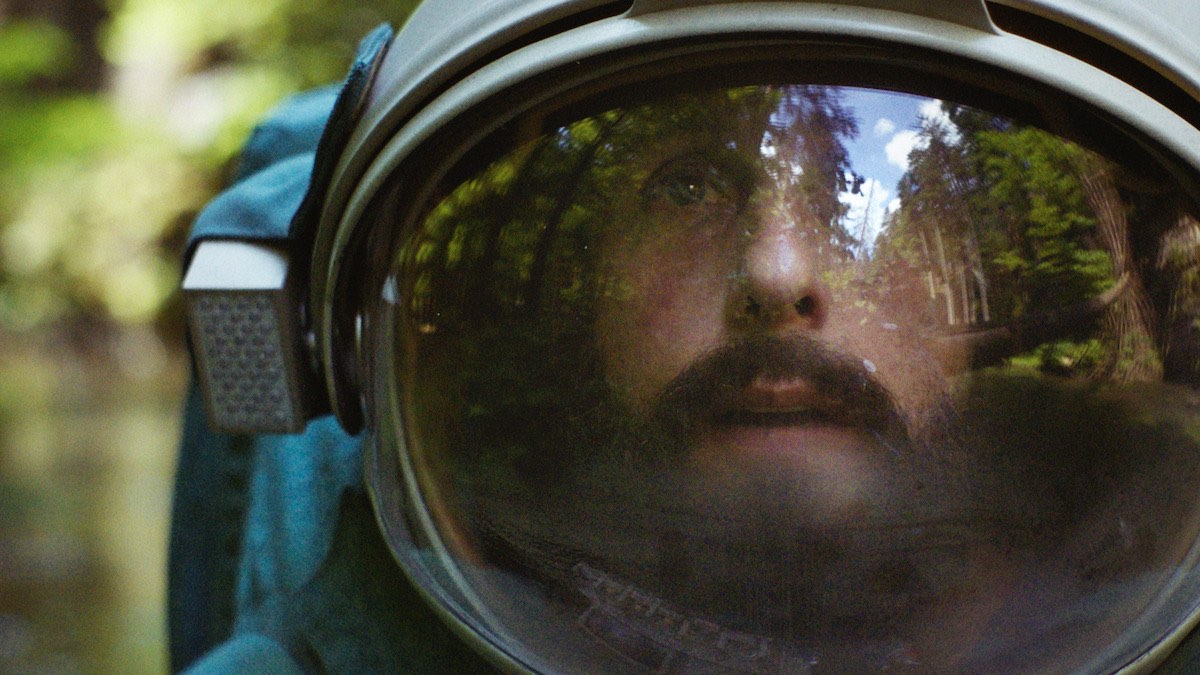The hook of Spaceman is simple enough: An astronaut (Adam Sandler as Jakub) is traveling thousands of miles into space over the course of a calendar year in search of answers both scientific and cosmic. He’s alone, he’s isolated, he’s doing his job—boldly going where no man has gone before—the best he can. We’ve seen movies like this before, so we know there’ll have to be a fair amount of scaffolding beneath this familiar set-up—the “how” and “why” going a long way to determining whether we remain in or out on Jakub’s harrowing solo odyssey.
The big turn here, however, comes when Jakub is no longer alone, joined onboard by an extraterrestrial creature (eventually revealed to be named Hanuš, and voiced by Paul Dano) who purports to be from “the beginning of the universe,” but who looks very much like a worst-case-scenario evolution of some mammoth outback spider. Hanuš ultimately serves as friend, psychologist, guide, and foil for Jakub as he hurdles toward the mysterious Chopra cloud, the phenomenon hovering outside of Earth’s atmosphere which he was sent to discover.
If you squint, you can imagine the kind of off-kilter buddy comedy that a Dano/Sandler two-hander could’ve resulted in if things were different. This, however, is not that. Spaceman, from Swedish director Johan Renck (best known for his work on Chernobyl), is more in the lineage of the kind of moody, despondent, contemplative space movies like Ad Astra, Moon, and Interstellar. To its credit, it often looks as good as those films, which is doubly impressive when you consider some of the sloppier fare that comes out of the ol’ Netflix factory.
Though most of the film takes place within Jakub’s ship, it’s shot and staged in a way that’s neither overly claustrophobic nor needlessly confusing. In a few early scenes we’re given pretty much everything we need to know about the parameters of his lonely existence, from video calls to his wife (Carey Mulligan as Lenka) that go unanswered to his daily treadmill routine and his inverted sleeping situation. Spaceman is a movie striving for epic emotional and cosmic grandeur—if it's going to work at all, it needs a vision that doesn’t undercut that.
The issues, however, come when we dive even a little deeper into what’s going on with Jakub and his many-legged companion. Suspension of disbelief isn’t always a tightrope. I’m willing to give a wide berth to a movie like Spaceman, with its big ideas and celestial aims. The “how” and “why” don’t necessarily need to be airtight, but I would like them to feel like they’ve been chosen for a reason, and in that respect Spaceman fails woefully.
Spaceman is a movie striving for epic emotional and cosmic grandeur—if it's going to work at all, it needs a vision that doesn’t undercut that.
So much of the first half hour of this movie is expository, stakes read like bullet points in a way that’s efficient if a little heavy-handed. We get a little bit about Jakub and his wife and unborn child back home, a little bit about the mission, a little bit about the Chopra cloud. That’s all well and good, but if you’re going to be so specific and bluntly explanatory about most every aspect of the film, then you can’t leave entire blackholes of reasoning unexamined. Why, for instance, is Jakub alone in the first place? What purpose would it serve to send a single man on what appears to be an absolutely essential exploratory mission? Because, I fear, there would not be much dramatic tension if he weren’t, a fact that even Isabella Rossellini—the film’s very own Basil Exposition—cannot dare utter.
Once all that explaining is through, the meat of the story comes in the relationship between Jakub and Hanuš, which quickly turns from combative to symbiotic. Hanuš’s interest in Jakub is, at first, purely anthropological. He’s watched humans from afar for some time and is rightfully confused by their illogical, self-destructive nature. His ability to read his new friend’s mind gives him insight into Jakub’s own faults, which include a pathological selfishness, an all-encompassing obsession with the stars, and a heaping pile of daddy issues. Their conversations then mostly become an excuse to give us one hazily rendered flashback after another, quick snapshots of pivotal moments almost completely devoid of context or stakes. “Where you go, I go, spaceman,” Mulligan’s Lenka repeats with a few different cadences. Half-baked character development at its finest.
By the end, we know a few truths—Jakub is sad, Lenka is sad, and Hanuš is absorbing all this sadness—but ultimately, all this dourness feels inert. Without any real moments of genuine dramatic tension (mission failures, unidentified distress calls, etc.) we’re left with the hope—need, really—that Spaceman will find a way to lead to some majestic, satisfying ending, a place where the mood can finally meet the story. And while it certainly tries, reaching desperately for the maudlin emotional payout of the iconic haunted bookshelf of Interstellar, it’s a film suffocated by time and space.









